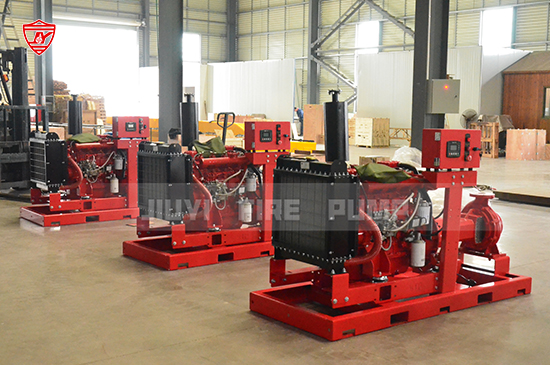A well-ventilated diesel fire pump room is essential for maintaining safe operation, preventing overheating, and ensuring compliance with NFPA 20 standards. Proper ventilation not only protects the diesel engine from excessive heat but also prevents harmful exhaust buildup, which can pose health and safety risks.

Why Ventilation Matters for Diesel Fire Pump Rooms
Diesel fire pumps generate significant heat and exhaust gases when in operation. Without proper ventilation, the room can experience:
- Overheating, leading to engine malfunctions and reduced efficiency.
- Exhaust gas accumulation, posing a health hazard to personnel.
- Reduced oxygen levels, impacting combustion efficiency.
NFPA Guidelines for Fire Pump Room Ventilation
According to NFPA 20, proper ventilation is required to maintain the pump room’s ambient temperature and remove engine exhaust gases. Key requirements include:
- Temperature Control: The room must stay below 120°F (49°C) under all conditions.
- Air Intake and Exhaust: Fresh air intake should be positioned low, while exhaust vents should be located near the ceiling to ensure proper airflow.
- Exhaust Ducting: Diesel engine exhaust must be directed outside the building using heat-resistant ducting.
Best Practices for Fire Pump Room Ventilation
- Install Adequate Air Vents: Ensure sufficient intake and exhaust openings based on engine size and heat output.
- Use Mechanical Ventilation if Necessary: In cases where natural ventilation is insufficient, install powered exhaust fans.
- Ensure Proper Ducting for Exhaust Gases: Route diesel exhaust through an insulated, corrosion-resistant duct to prevent leaks and heat damage.
- Maintain Clearance Around the Diesel Engine: Provide enough space for airflow to dissipate heat efficiently.
- Regularly Inspect and Maintain Ventilation Systems: Check vents, fans, and ducting for blockages or damage to ensure continuous operation.
Conclusion
Proper ventilation in a diesel fire pump room is crucial for safety, efficiency, and compliance with fire protection regulations. Following NFPA 20 guidelines and implementing best practices will help prevent overheating, improve engine performance, and create a safer working environment.
